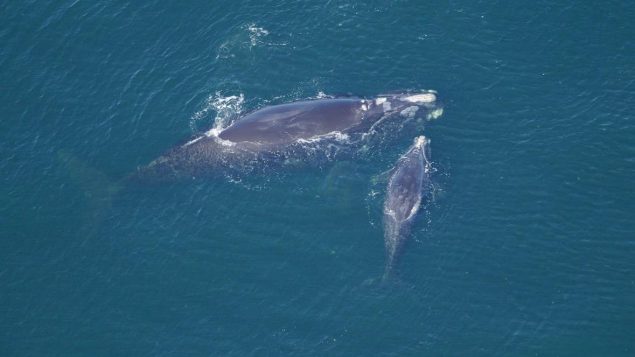Officials with Fisheries and Oceans Canada say two more endangered North Atlantic right whales have been found dead in the Gulf of St. Lawrence.
The whales were found near the Acadian Peninsula, New Brunswick and west of the Magdalen Islands, Quebec, officials said. These are the third and fourth confirmed dead North Atlantic right whales reported in Canadian waters this year.
The department said it is working closely with marine mammal experts on two necropsies to determine the cause of death of right whales found earlier this month in the gulf.
On June 7, veterinarians from the University of Prince Edward Island and the University of Montreal conducted a necropsy in coordination with DFO and the Marine Animal Response Society in Miscou, NB.
These experts reported that there was no evidence of recent fishing gear entanglement or recent vessel strike in their preliminary assessment, DFO said in a statement.
Further testing is ongoing to identify other potential causes of death.
- Deaths of endangered North Atlantic right whales driven by manmade causes, says study
- Dead right whale known as ‘Wolverine’, had survived ship strike, entanglements
A second necropsy is currently being conducted by the veterinarian team from the University of Prince Edward Island in Petit Étang, NS, of the dead whale reported on June 20.
A team of 25 to 30, including biologists, veterinary pathologists and veterinary technicians, hopes the necropsy will help shed light on how the large female died.
“They’re basically going to dissect the whale from one end to the other and do a really close examination of every bit that they can,” said Isabelle Elliott, the marine mammal response co-ordinator for the Department of Fisheries and Oceans in the Gulf region.
“This whale is definitely a big one. She’s probably one of the bigger ones that we have, unfortunately, had the privilege to do a necropsy on in the last couple of years.”
Biologists have identified the whale as Punctuation, so named due to the scars on her head that look like dashes and commas.

Punctuation is seen with her calf swimming off the coast of Georgia in 2006. (New England Aquarium taken under NMFS/NOAA permit #655-1652-01)
Necropsies on the enormous animals take time and are highly demanding on everyone involved, officials said.
The team will first peel off the blubber and measure its depth to see if the whale was emaciated. Then, scientists will examine the muscle tissue and bones for signs of trauma. Finally, they’ll look at the organs and take samples for toxicology tests before the carcass is disposed of in a nearby quarry.
The vital information and findings from these necropsies on right whales are key for understanding the threats they face, and what could be done to better protect them and support their recovery, DFO officials said.
“Fisheries and Oceans Canada continues to take all necessary actions to protect the endangered North Atlantic right whale from further harm,” DFO officials said in a statement, adding that it’s a shared responsibility.
“We have been working closely with partners in Canada and the United States, coastal communities and industry partners to detect right whales and to implement robust management measures that mitigate risks to the species.”
This includes ongoing fishery closures in Atlantic Canada and Quebec for snow crab and lobster fisheries and all other non-tended fixed gear fisheries based on confirmed right whale sightings since April 28, 2019, officials said.
In 2017, 12 North American right whales were found dead in Canadian waters and five in U.S. waters.
The global population of North Atlantic right whales is estimated to be approximately 411 in 2018.
With files from Cassie Williams of CBC News







For reasons beyond our control, and for an undetermined period of time, our comment section is now closed. However, our social networks remain open to your contributions.